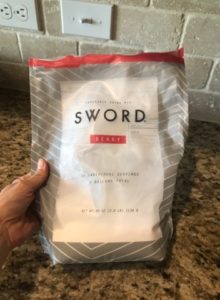The weekly long run is incredibly important during marathon training. Since it’s an endurance event, you’re going to need to build yours up. The best way to do that is incorporating one long run per week into your training. These can be daunting, but with the right preparation, they’ll go so much better!
Preparing for a long run during marathon training is your first line in getting it completed successfully. And who doesn’t love checking off one more great long run off the list? I know I do.
Here are the 10 steps we’ll go over to show you how to prepare for your long run:
- Know what you’re using for mid-run nutrition.
- Check the weather forecast.
- Determine your long run route.
- Have your running outfit laid out.
- Roll and stretch.
- Have a new music or podcast playlist loaded up.
- Charge your devices.
- Go to bed early.
- Be up on time.
- Use Vaseline.
Let’s talk first about why preparing for a long run matters so much.
Why Preparation is Key to Nailing Your Long Run
“Fail to plan, plan to fail” is a saying that ties in nicely when it comes to long run preparation. Skipping out on this key component can sabotage your long run before you even start. If that sounds dramatic, I assure you it is not. There is SO much that goes into these runs.
Consider this:
You will be running for close to 2 hours on your shorter long runs and up to 3.5 hours on your longest ones. Getting lost, wearing uncomfortable clothing, leaving too late that you’re running in the hot sun are all things that can quickly make your long run go awry. And the way I see it, you only get one shot per week at this long run thing and you need to make it count.
Like anything, I think one of the biggest reasons getting everything lined up ahead of time is the peace of mind it gives you. The mental game in marathon running is crucial to success. In order to achieve the necessary physical components to conquer the marathon distance, you need to believe you can do it. When you prepare for your long runs, a large stressor is taken out, and you can just focus solely on ticking off those miles.
Some of these prep strategies should be accomplished the night before whereas the rest will take place the morning before your long run.
I suggest being up a minimum of 1 hour before your long run starts – I know some people prefer closer to the 2-hour mark to digest their breakfast. And speaking of breakfast…let’s get started with everyone’s favorite subject – food.
Our Top 10 Tips to Prepare for Your Long Run
1. Get your mid-run nutrition set.
This takes time to figure out. And the fact is that many people can get through half-marathon long runs without fueling at all, so it’s possible you haven’t even really had to deal with this before.
Getting your nutrition right for a long run is a key component to successful marathon training. So figure this out early on…meaning play around with your nutrition in your shortest long runs of the season. If something makes your tummy feel off, then stop using it immediately and try something else. Read my article about what to eat during your long runs and marathon to figure out the best nutrition for you!
Once you do, DON’T change it!
Then, get it all laid out and ready the night before. I personally use a product called Sword – which I highly recommend for anyone wanting natural, high-carb liquid-only nutrition that’s easy on the stomach. (Tailwind is another popular similar product.) I mix this the night before and put it in the fridge. Then in the morning all I have to do is pour it into my VaporHowe Hydration Vest (I love this so much!) and I’m set for my entire run. And yes, this is all I take in for every single long run including during the marathon.

What you eat before you leave for your long run certainly matters, too. I talk about this in my article The Carbo-Load: Why do marathon runners do this?, but anything carb-heavy and easily digestible is a safe bet for most people. Good go-tos include a bagel with peanut butter and a banana. I personally eat PB RX bars.

2. Check the weather.
I’d say to do this early in the week to start gearing up for the weather that will likely present itself on your long run day. Additionally, if you see that the weather won’t be great for your typical long run day but you’re available the other weekend day, you can consider switching it up for that particular weekend. This could possibly impact your other runs during the week prior, which is why I’d start checking the weather 7 days out. One example where I’ve done this is in the summer where I have a difference of 10 degrees between the two days. The difference between 80 and 90 degrees may not seem significant, but it really is. I would absolutely switch my days around to get the cooler day if at all possible.
Then check the weather again the day before just to finalize your long run outfit. Having the right gear for a comfortably dressed long run is important.

3. Plan your route.
You might be thinking, meh, I have my Garmin so I don’t need to figure this out ahead of time. But I assure you that you’ll want to know exactly where you’re headed when you leave in the morning. I would even go as far to say that you can get this entirely planned out for your entire training block weeks in advance. (Ok so I don’t do this but if I were more organized it would be a smart idea!) The reason I say this is because you can avoid boredom on your long runs by running the same route every single time.
You may have to drive a little ways to get some extra hills into your long runs or some more scenic views, but this extra effort can go a long way.
Planning your route also means you won’t get lost or in a situation where you’re adding on extra miles that aren’t in your plan. I normally run somewhere that I pretty much know like the back of my hand now (or you can also run an out-and-back which simplifies this) but whatever you decide, just know where you’re headed.
4. Have your running outfit all laid out.
Ideally, you’ll determine a favorite running outfit early on in your marathon training. If you wear a particular outfit on a shorter long run and it feels comfortable throughout, then try the same outfit again on your next long run. If it still feels great I highly recommend having this be your go-to outfit for every single weekly long run going forward. This then should also be your race day outfit! I’m a key believer in changing nothing up for race day and your outfit (on top of your nutrition) definitely counts!
I wear the same running shorts with side pockets every single long run. They might not hold a candle to my Lululemon running shorts in the looks department, but they hold my phone, never ride up, and never chafe. Comfort is key when it comes to your long runs. And you better believe I’m throwing those in the wash come Saturday morning so I have them ready to go before long run Sunday rolls around.
I would also like to mention how much socks matter in this equation, too. If they’re not my sweat-wicking like Smartwool socks then I’m not wearing them.
Not sure what to wear for your long runs and marathons? I prepare you for any weather in, “What to Wear for Marathon Race Day.”
5. Get ready to roll.
And by this, I mean foam rolling. I will be the first to admit that I am lacking in the stretching portion of my marathon training. But foam rolling is something I do every night before a long run as well as the morning of. Foam rolling, as opposed to traditional stretching, gets deep into the fascia, which really breaks down tightness in the muscles. For me personally, I need to get my calves foam rolled really well in order to alleviate any Achilles tendonitis issues I may be having. Everyone seems to have a weak area from time to time (or an area more prone to injury I guess I could say) and this happens to be mine. But foam rolling is great for the entire body. Not sure how to go about it? The following video has a great demo to get you started.

Dynamic stretching is something else I do before heading off for my long run.
6. Line up your playlist.
No matter what it is you like to listen to – music, podcasts or audiobook – make sure you have these downloaded and queued up. Keeping boredom away on your long run is important, as I wrote about in this article, and choosing carefully about what you listen to can help with that.
I personally like to start with a podcast (Running Rogue is my go to!) to make sure I’m easing into my long run and not overdoing it. With one of those being about an hour-long that takes care of my first 6-7 miles. After that, I switch to music to keep it interesting. Having different playlists available means you won’t get in a rut listening to the same songs over and over every week.
7. Make sure everything is charged up and ready.
The technology I use to get through my long runs includes my phone, wireless headphones, and Garmin watch. I would be a sad panda if any of these weren’t ready to go when it was time to head out the door for my long run. So before you go to bed, make sure each of these are plugged into a charger. Since your long run could easily be 3+ hours, you’re going to want a full charge on these items. I have had my Garmin crap out mid-run and that sucked.
8. Go to bed early.
I would say I get a C- in this category. I’m the worst when it comes to getting enough sleep during marathon training even though I sing its high praises in “How Sleep Can Give You the Edge You Need in Marathon Training.” I definitely don’t stay out too late, I just don’t close my eyes at a reasonable time that would allow me to maximize my sleep. Don’t do that.
Sleeping really will help you feel great on your long run so you can persevere. And I’m not just talking about the night before your long run, getting good sleep all through marathon training is the best way to maximize your abilities and reduce injury. Even if you don’t feel “sleepy” a lack of sleep over time can wreak havoc on your body in ways that may not be immediately obvious.
9. Then don’t hit snooze.
Even if you’re not meeting up with anyone for your long run, you should get up when your alarm goes off and leave the house exactly when you planned to leave the house. If you do, everything else will fall into place as it should after the fact.
Cutting off time from your morning prep or getting out the door late can be detrimental. Mentally, this throws off your long run game. I love having a calm, quiet morning before I leave the house and this helps me get my mind right. If I end up scrambling or eating breakfast late, my long run doesn’t get off to a good start.

But let’s say you just decide to sleep in and leave later since you’re on your time. This can often mean you’re running the last half of your run in very warm temperatures and that’s not doing you any favors. I’ve also left late thinking I’ll be able to squeeze in my miles before I have to get back and get ready for (insert normal weekend plan of a mom of 3) and then I end up running my miles faster than I should or feeling stressed out looking at my watch as I run. NOT good.
10. Slather your body in Vaseline.
No, but seriously, don’t skip this step. You will be so very sorry if you do. You can trust me on this one because I’ve been here more than once. Not usually because I skipped this altogether (but that HAS happened) but usually because I miss a key spot when I’m in a hurry. I have an entire article devoted to why you should use Vaseline or similar (such as Body Glide) to prevent chafing and where to apply it. Here’s the short version: put it anywhere you think fabric will rub against your skin or you will be in a world of hurt if you don’t.
Even underwear chafes! Find out my best running undies recommendations for both men and women here.
Preparing for the Long Run Leads to Marathon Success
If this list seems overwhelming that’s because it kind of is! Marathon training is intense and a lot goes into ensuring these runs go as seamlessly as possible. Once I have everything packed, donned and ready, I always do a mental double-check that I have everything. Having a checklist can even make sure you don’t miss a single step.

Bumping up mileage each week can be daunting, so mentally preparing as well as having all of your items laid out and ready before you leave for your long run can make a big difference.







